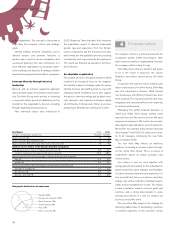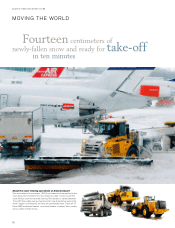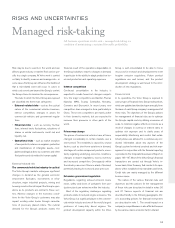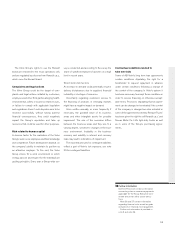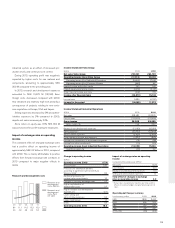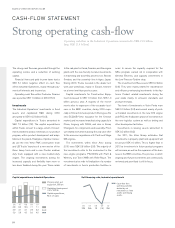Volvo 2010 Annual Report Download - page 59
Download and view the complete annual report
Please find page 59 of the 2010 Volvo annual report below. You can navigate through the pages in the report by either clicking on the pages listed below, or by using the keyword search tool below to find specific information within the annual report.
The Volvo Group’s rights to use the Renault
brand are restricted to the truck operations only
and are regulated by a license from Renault s.a.s.,
which owns the Renault brand.
Complaints and legal actions
The Volvo Group could be the target of com-
plaints and legal actions initiated by customers,
employees and other third parties alleging health,
environmental, safety or business related issues,
or failure to comply with applicable legislation
and regulations. Even if such disputes were to be
resolved successfully, without having adverse
financial consequences, they could negatively
impact the Group’s reputation and take up
resources that could be used for other purposes.
Risk related to human capital
A decisive factor for the realization of the Volvo
Group’s vision is our employees and their knowledge
and competence. Future development depends on
the company’s ability to maintain its position as
an attractive employer. To this end, the Volvo
Group strives for a work environment in which
energy, passion and respect for the individual are
guiding principles. Every year a Group-wide sur-
vey is conducted, and according to the survey the
share of satisfied employees has been on a high
level in recent years.
Short-term risk factors
An increase in demand could potentially result in
delivery disturbances due to suppliers’ financial
instability or shortage of resources.
Uncertainty regarding customers’ access to
the financing of products in emerging markets
might have a negative impact on demand.
Volvo verifies annually, or more frequently if
necessary, the goodwill value of its business
areas and other intangible assets for possible
impairment. The size of the overvalue differs
between the business areas and they are, to a
varying degree, sensitive to changes in the busi-
ness environment. Instability in the business
recovery and volatility in interest and currency
rates may lead to indications of impairment.
The reported amounts for contingent liabilities
reflect a part of Volvo’s risk exposure, see note
29 for contingent liabilities.
Further information
Note 34 Personnel contains information
concerning rules on severance payments
applicable for the Group Executive Com-
mittee and certain other senior execu-
tives.
Note 36 and 37 contain information
regarding financial risks as well as goals
and policies in financial risk management.
Further risk information is provided in
note 2 and note 29.
Contractual conditions related to
take over bids
Some of AB Volvo’s long term loan agreements
contain conditions stipulating the right for a
bondholder to request repayment in advance
under certain conditions following a change of
the control of the company. In Volvo’s opinion it
has been necessary to accept those conditions in
order to receive financing on otherwise accept-
able terms. Provisions stipulating that an agree-
ment can be changed or terminated if the control
of the company is changed are also included in
some of the agreements whereby Renault Trucks’
has been given the right to sell Renault s.a.s.’ and
Nissan Motor Co. Ltd’s light-duty trucks as well
as in some of the Group’s purchasing agree-
ments.
55





